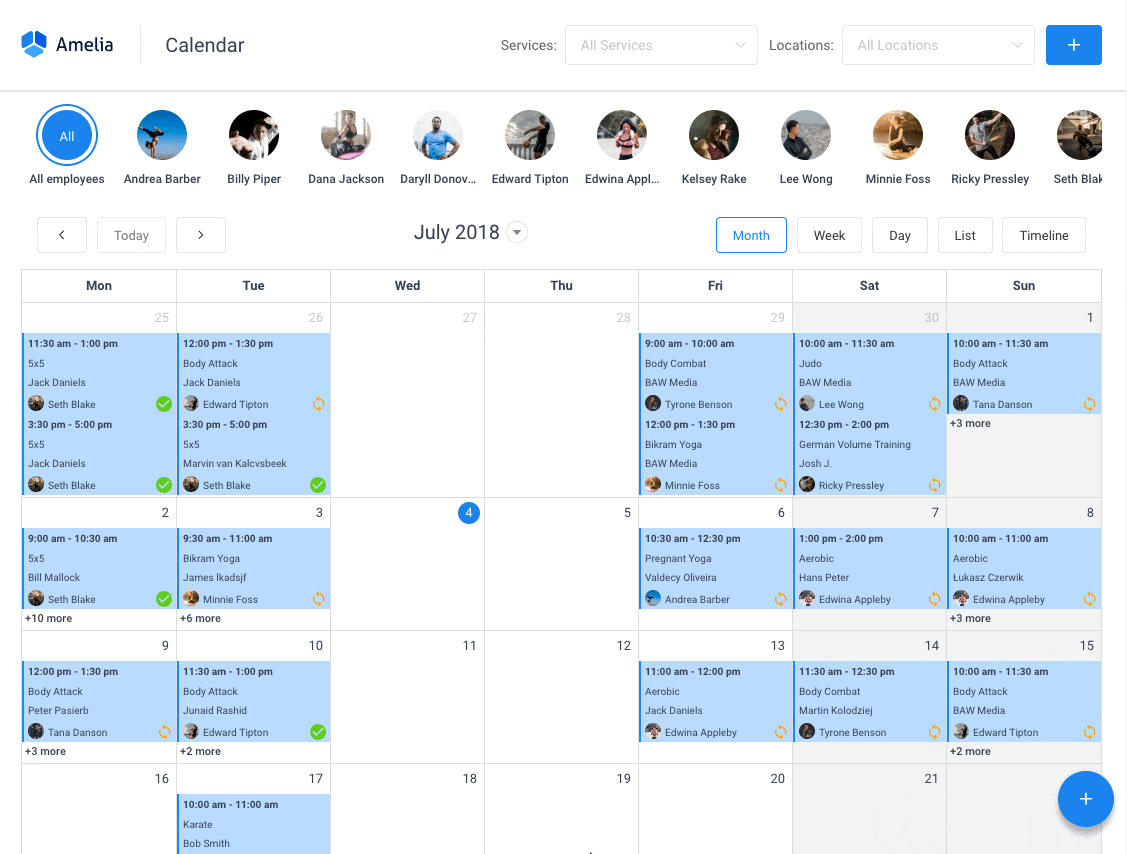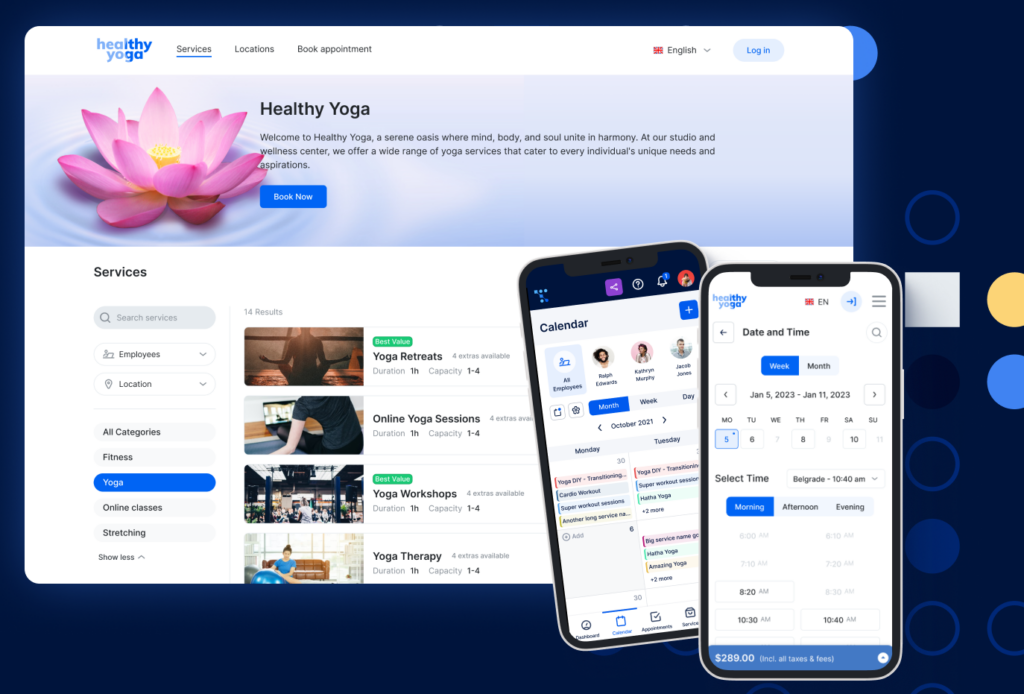In today’s digital age, businesses of all sizes are constantly looking for ways to streamline their operations and enhance customer experiences. One effective solution for service-based businesses is the utilization of a WordPress booking plugin.
This powerful tool can simplify the appointment scheduling process and help manage bookings efficiently. However, like any technology solution, it comes with its own set of advantages and disadvantages.
In this article, we’ll explore the pros and cons of using a WordPress booking plugin to help you make an informed decision.
What Is a WordPress Booking Plugin?
Before diving into the pros and cons of using a WordPress plugin for managing your bookings, let’s clarify what exactly such a plugin is in the first place.
Simply put, a WordPress booking plugin is an add-on for your WordPress website that enables you to manage appointments, bookings, and reservations. These plugins are designed to make the process of scheduling and organizing appointments seamless for both business owners and customers.
What Are the Benefits of Using a WordPress Booking Plugin?
1. WordPress is widely used and has a strong community

Image by pikisuperstar on Freepik
WordPress powers nearly 40% of all websites on the internet, making it one of the most popular Content Management Systems (CMS). It’s so widespread that, if you have a website, the chances are you’re using WordPress already.
Such popularity means that you have access to a vast community of developers, designers, and users who continuously contribute to its growth and improvement. In fact, the extensive user base of WordPress has led to the development of a wide range of plugins, including booking plugins. This enables you to easily find and install booking plugins that suit your specific business needs.
Moreover, with millions of users, there’s a wealth of online forums, tutorials, and support channels where you can seek assistance if you encounter any issues with your booking plugin. The community’s dedication to helping one another ensures that you can find solutions to problems quickly.
What’s more, WordPress and its plugins receive regular updates to improve functionality and security. This means that your booking plugin is less likely to become outdated and vulnerable to security breaches.
2. Everything you need in one place
Having everything related to your website, including booking functionality, in one place offers several advantages and is especially convenient if you run a small business:
- Efficient management: Centralizing your online booking system within your WordPress website streamlines management. You can manage bookings, website content, and design all from the same dashboard.
- Consistent user experience: Customers benefit from a consistent and familiar user experience when booking appointments on your website. They don’t need to navigate to separate platforms or websites, which increases their confidence in your brand.
- Integration with other tools: Integration with other plugins or tools you use for marketing, analytics, or customer management can be more seamless when everything is within your WordPress environment.
3. You have complete control over processes & data
Another significant advantage of a WordPress booking plugin is the level of control that comes with WordPress.
Your data, including customer information, booking history, and business processes, is stored on your server. This ownership ensures that you have control over your data and how it’s used, providing peace of mind in terms of data privacy and security.
Unlike some third-party booking platforms, where you may have limited control, using a WordPress booking plugin means that no one else can make changes to your online booking system (except for the hosting provider).
Moreover, such control and ownership allow you to customize every aspect of your booking system to meet your exact needs. This includes the appearance of your booking forms or the specific booking rules and pricing structures you want to implement.
4. WordPress has plenty of customization options
When it comes to customization, WordPress is renowned for its flexibility and adaptability, which extends to booking plugins. And what does this mean for you?
First off, you can choose from thousands of WordPress themes and templates, which are often compatible with various booking plugins. This allows you to create a visually appealing and user-friendly booking experience.
Next, WordPress booking plugins often integrate seamlessly with other WordPress plugins, expanding the functionality of your website. For example, you can integrate payment gateways, social media sharing, and email marketing tools to enhance the booking process.
In addition, if you’re an advanced user, you can delve into Cascading Style Sheets (CSS). This will enable you to fine-tune the appearance and layout of booking forms and calendars to align perfectly with your brand’s identity.
5. WordPress plugins are more affordable
Last but not least – cost-effectiveness is a compelling reason to consider using a WordPress booking plugin.
Building a custom booking system from scratch can be quite expensive. And WordPress plugins offer a cost-effective alternative, saving you both time and money.
Most WordPress booking plugins offer various pricing plans, including free and premium versions. This flexibility allows you to choose a solution that matches your budget and business requirements. Additionally, unlike some SaaS booking platforms that charge recurring fees, once you purchase a WordPress booking plugin, you typically own it and don’t have any ongoing licensing costs.
What Are the Disadvantages of Using a WordPress Plugin for Managing Bookings?
1. WordPress-powered websites require a lot of time, money, and technical knowledge
Managing a WordPress-powered website, including one with booking functionality, can come with several challenges:
- Technical expertise: While WordPress is known for its user-friendly interface, managing a website effectively often requires technical knowledge. You need to take time to become familiar with WordPress, select a suitable theme yourself, configure it properly, choose the set of plugins, choose a hosting provider with a server sufficient for your needs, buy a domain, connect it to the hosting, make sure the website is both mobile- and desktop-friendly, and so on. Of course, you can always decide to hire a web designer/developer to create a professional and fully functional website for you, but that won’t be cheap.
- Financial burden: WordPress websites require ongoing investment in hosting, premium themes, and plugins. This can quickly become a financial burden, particularly for small businesses that have limited budgets.
- Time-consuming updates: WordPress regularly releases updates for core software, themes, and plugins. Keeping everything up-to-date is essential for security and functionality, but it can be time-consuming as every single component needs to be regularly monitored and updated. And things tend to get even more complicated whenever a compatibility issue arises.
- Constant monitoring: You are the one in charge of running constant monitoring, data backups, and security checks. This step is especially important when you run an appointment-based business. Why? Just imagine if something were to happen to all that sensitive client data and personal information stored on your website. To prevent this from happening, you have to keep everything in check, which can be quite a complex task for those users who are not that tech-savvy.
- Security concerns: WordPress is a prime target for hackers due to its popularity. It’s vital you ensure the highest level of protection against cyber threats and stay vigilant at all times.
2. Too much flexibility can be dangerous

Image by Freepik
In theory, WordPress is very customizable and flexible. And while it is (it’s a great CMS and we love it!), all this flexibility can also be a double-edged sword.
Why?
What we see in practice is that, unfortunately, with business growth comes complexity. WordPress users see the platform as a constructor and try to build an “app” by combining dozens (sometimes literally hundreds!) of plugins. What’s more, as your website grows, the needs of your website grow, too, so you’ll need plugins designed for SEO or speed optimization purposes. And installing too many plugins can slow down your website’s performance. Each plugin adds code and functionality, and conflicts between plugins can lead to technical issues and instability.
Moreover, WordPress themes rarely turn out to be as beautiful as seen in demos, so you have to add a lot of CSS and other manual adjustments to achieve the desired look and feel. Also, some booking plugins need manual adjustments to your website’s theme or template to function correctly. This can be time-consuming and may require technical expertise in CSS and HTML.
What’s more, WordPress websites with numerous plugins and customizations can become complex with many moving parts. Any change to one component can lead to unintended consequences elsewhere on the website.
The bottom line is that a more or less developed real-life WordPress website often turns out to be a large, slow, fragile, complex setup with lots of moving parts. Any change to one component can lead to unintended consequences elsewhere on the website and many plugins often end up conflicting with each other. Having a crucial business part, such as managing bookings and schedules, inside of such a system may cause deep frustrations.
3. WordPress has certain technical limitations
It goes without saying that WordPress is a versatile platform. However, there are some technical limitations that are quite hard (or impossible) to overcome.
WordPress was originally designed as a blogging platform, so most plugins used for additional functionalities, including booking, are built on top of this blogging foundation. This means that the majority of plugins have to be built on top of the blogging platform, often using workarounds and “patches” to enable features not originally supported by the platform. The result? Slower functioning.
Also, the same plugins that extend WordPress functionality can sometimes result in slower website performance. This is particularly true when you use numerous plugins to add complex features. So, if you have a large and complex website, you’ll probably encounter your fair share of lags, bugs, and slow performance.
Moreover, WordPress is a downloadable PHP software and, as such, it may not allow the use of certain modern technologies and frameworks that are more common in newer web development platforms. These technologies include performance-optimized execution, advanced caching, creating a dedicated mobile app, using machine learning and AI algorithms, and many others.
4. The Size of a Business Can Pose a Challenge
The scalability and practicality of using WordPress for booking management actually depend on the size and type of your business.
As your business grows, having everything in one place within a WordPress website can become overwhelming and messy. Website marketing is one thing, and managing bookings, appointments, and payments is another. Having both systems in one place is fine when you have a small business, run by a small team of a few trusted people. However, once you start having hundreds and thousands of appointments, or few business locations, things can get pretty hectic pretty quickly.
Coordinating access and permissions for multiple team members can be quite a challenge. Let’s say you have thousands of website visits per day; you don’t want a newbie appointments manager to click something wrong in the WordPress admin panel and cause a change that will affect the entire website. So, it makes perfect sense to extract the booking management at one point (the dashboard part, while the front end of course should be embedded in the website).
Also, as your business scales, ensuring the highest level of security becomes more complex, especially if multiple people have access to the WordPress admin panel. As security breaches can have severe consequences, you should be very careful when it comes to the number of people who can access the admin panel.
On the other side, very small businesses often don’t need a full-fledged WordPress website. This is especially true if their primary online presence is on social media. And, let’s face it, most of the service businesses that belong to the beauty and fitness niche use social media platforms to sell their services. In such cases, adding a WordPress website solely for booking might be an unnecessary extra step.
So, When to Use a WordPress Booking Plugin?

Choosing whether or not to use a WordPress booking plugin for your business isn’t a one-size-fits-all decision. It depends on various factors, including the nature of your business, your technical expertise, and your website’s complexity.
For instance, small to medium-sized businesses often find WordPress booking plugins to be a practical solution. They are typically cost-effective and easy to set up, making them accessible to businesses with limited resources. However, as your business scales, having everything, including booking functionality, within a WordPress website can become complex. Coordinating access for multiple staff members can be challenging, and security becomes a greater concern. That’s why larger enterprises may prefer more robust booking solutions that offer advanced features and scalability.
In addition, WordPress booking plugins are well-suited for businesses with relatively straightforward booking needs. They offer essential features for appointment scheduling and you can set them up quickly without extensive technical expertise. On the other hand, if your website is highly complex, with numerous integrations and customizations, integrating a WordPress booking plugin might become challenging. Maintaining compatibility and avoiding conflicts with other plugins becomes more critical.
Although WordPress has a user-friendly interface, some degree of technical knowledge is helpful. Basic skills in website management, plugin installation, and updates are beneficial for a smooth experience. Keep in mind that managing a WordPress website effectively, especially with added booking functionality, can become challenging without technical expertise. Troubleshooting issues, optimizing performance, and implementing advanced features may require assistance.
Finally, WordPress booking plugins are versatile and can cater to various industries. However, businesses with highly specialized booking requirements may find it necessary to explore custom solutions. If your business operates in a niche industry with unique booking needs, you might encounter limitations in off-the-shelf plugins. Custom development may be required to meet specific demands.
Amelia: The Only WordPress Booking You Need
When it comes to selecting a WordPress booking plugin, Amelia stands out as a top choice for businesses and individuals seeking a robust and user-friendly solution.
With its feature-rich functionality, intuitive interface, and flexibility, Amelia is a go-to option for your booking needs.
Why Amelia stands out:
- User-friendly: An easy-to-navigate dashboard makes setup and customization a breeze, even for those without extensive technical expertise.
- Comprehensive features: Amelia offers a wide range of features, from appointment scheduling and calendar management to payment integration and email notifications, ensuring that it covers all aspects of your booking process.
- Customization options: Tailor the booking system to match your brand’s identity seamlessly. You can customize booking forms, calendars, and notifications to create a personalized booking experience for your customers.
- Affordability: Amelia provides excellent value for money with its competitive pricing structure, making it accessible to businesses of all sizes.
- Regular updates and support: The Amelia team consistently delivers updates and offers reliable customer support, ensuring that your booking system remains up-to-date and functional.
Are you looking for a WordPress booking plugin that combines versatility, ease of use, and a comprehensive feature set?
Look no more – embrace Amelia and take your bookings to the next level!
Are There Any WordPress Booking Plugin Alternatives You Could Use?
The good news is that, in case you decide that a WordPress booking plugin isn’t the right fit for your business, there are some alternatives for you to consider. These include using dedicated booking software, which you can develop in-house, or opting for a booking SaaS (Software as a Service) solution.
What is a booking SaaS?
A booking SaaS is a cloud-based service specifically designed for managing bookings and appointments. Basically, these services are accessible online, eliminating the need for businesses to host and manage the software themselves.
Booking SaaS offers the advantage of simplicity and scalability. What’s more, such solutions often require less technical expertise compared to managing a WordPress website. Everything is taken care of – servers and data centers, file storage, maintaining the hardware and software infrastructure, monitoring, backups and recovery, data protection, software installation and configuration, and so on. The only thing you need to do is to sign up and get your own piece of software up and running.
So, no dealing with web developers and designers on your end, no hosting and servers, no maintenance, and no updates. Everything is still done ‘under the hood’, but you don’t have to worry about it anymore.
Advantages:
- Accessibility: Booking SaaS solutions are typically cloud-based, allowing users to access them from anywhere with an internet connection. This is especially convenient for remote or mobile operations.
- Ease of setup and use: Setting up a booking SaaS is often quicker and requires less technical expertise than custom solutions. Many SaaS platforms offer user-friendly interfaces that are fairly easy to use even if you have zero technical background.
- Automatic updates: SaaS providers handle software updates and maintenance, ensuring that businesses always have access to the latest features and security enhancements. This can save a ton of time for you, as updates are automatic and there’s no need for a manual setup.
- Scalability: Many booking SaaS platforms are designed to scale with your business, accommodating growth without extensive modifications. This means that, once you pick the right booking software for you, the chances are it will stay with your business as long as you want it to.
- Cost predictability: SaaS solutions often have subscription-based pricing models, providing cost predictability without significant upfront expenses.
Trafft: The Booking SaaS Solution You’ll Love
When it comes to booking Software as a Service (SaaS) solutions, Trafft stands out as a top contender that’s sure to win your affection.
With its user-friendly interface, feature-rich offerings, and flexibility, Trafft is the ideal choice for your booking needs.
Why Trafft shines as a booking SaaS solution:
- Ease of use: Trafft’s user-friendly design ensures a seamless experience from setup to daily operations. You don’t need to be a tech wizard to make the most of its capabilities.
- All-in-one solution: Trafft offers a comprehensive suite of features, from appointment scheduling and calendar management to payment processing and client communication. It covers all aspects of booking management in one convenient platform.
- Customization: Tailor Trafft to your specific needs with customizable booking forms, branding options, and integration possibilities. Your booking system can truly reflect your business’s unique identity.
- Scalability: Whether you’re running a small startup or managing bookings for a large enterprise, Trafft can easily adapt to your requirements, allowing you to grow without complications.
The best thing? Trafft comes with a free trial and, in case you have a small team, Trafft’s free plan is for up to 5 users.
Sing up today and see for yourself why Trafft is the standout choice that’s bound to win your heart.
What’s the Verdict: WordPress Booking Plugin or Booking SaaS?
In conclusion, the decision to use a WordPress booking plugin or explore alternative solutions depends on your business’s size, needs, and technical capabilities. WordPress booking plugins offer many benefits, such as affordability and customization, but come with their own set of challenges, including technical limitations and the need for ongoing maintenance.
Before making a decision, carefully assess your business requirements, budget, and the level of control you desire over your booking system. Consider exploring booking SaaS options if they better align with your goals. Ultimately, the right choice will help you efficiently manage appointments and enhance the overall experience for your customers.



